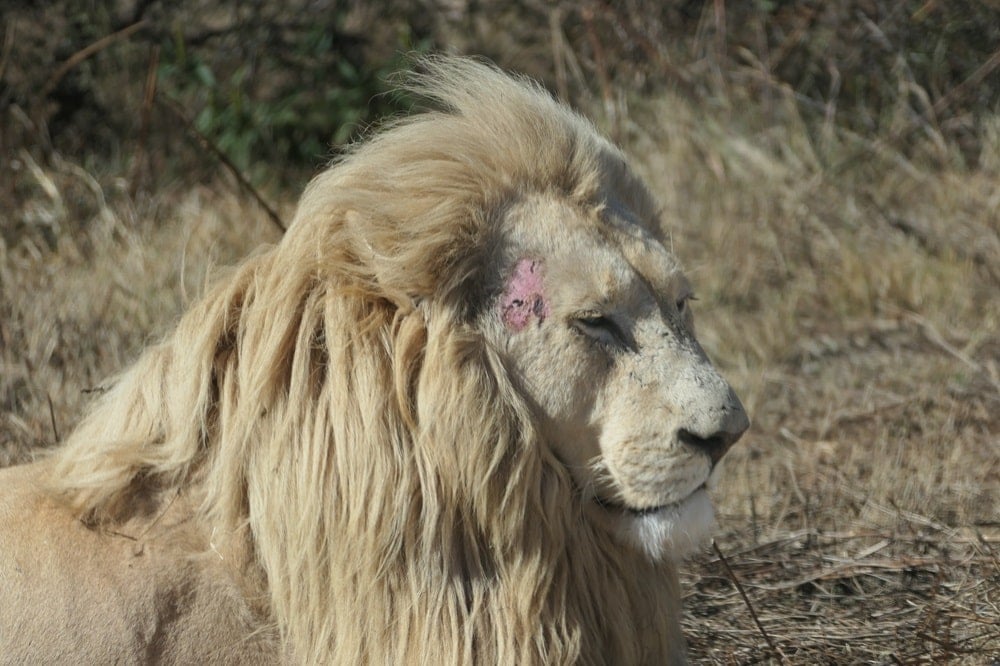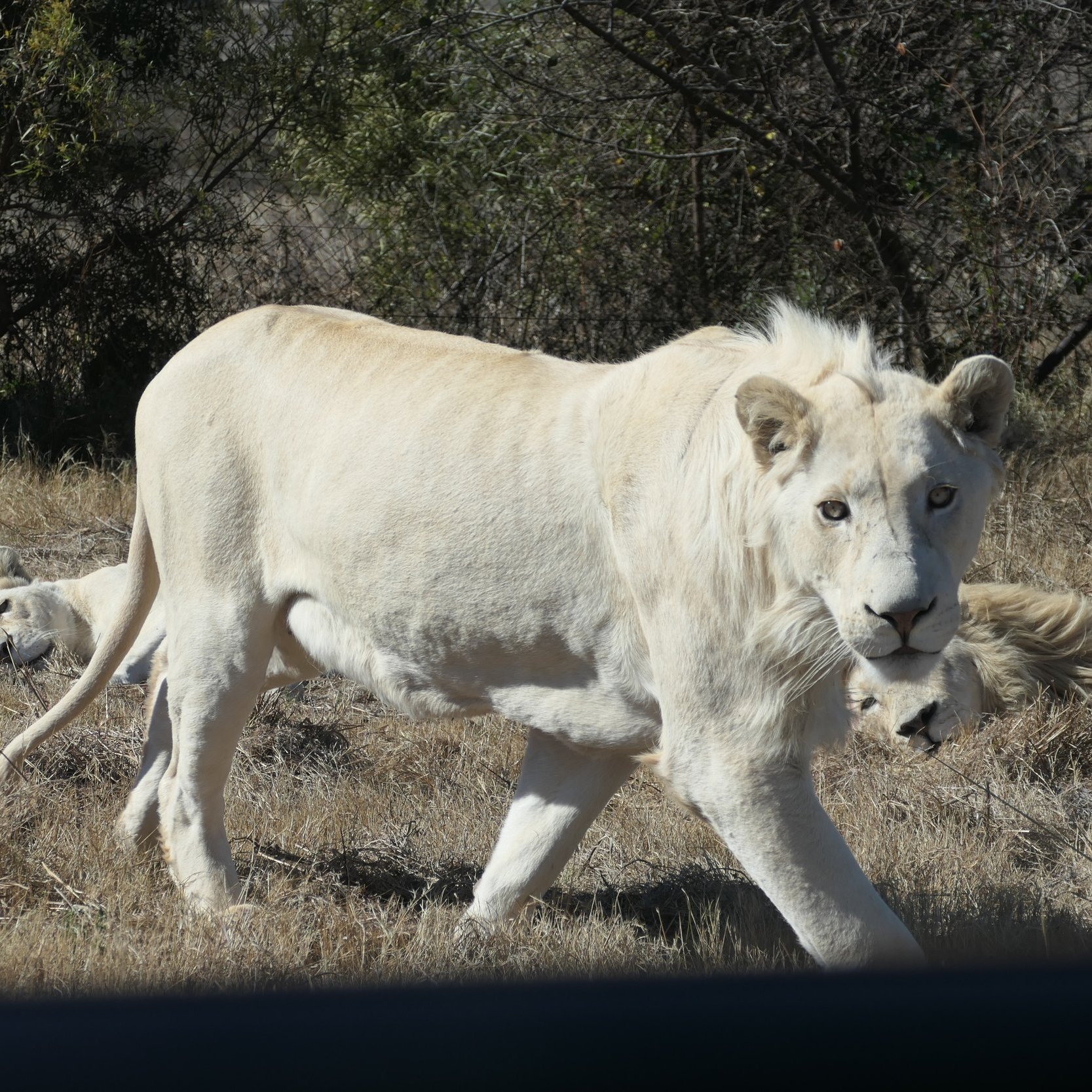Lions in South Africa are important, each as a part of the pure ecosystem and as a symbolic and religious a part of the nationwide id. However the launch of the captive lion breeding business within the Nineteen Nineties has had devastating results on each wild and captive South African lions — and present efforts to cut back lion breeding and its impacts are simply not sufficient.
This grew to become notably obvious when the South African Ministry of Forestry, Fisheries, and the Setting launched a report recommending voluntary exit choices for the captive lion business. Whereas stepping stone, World Animal Safety and our companions, Blood Lions South Africa, are advocating for stronger measures.
To elucidate why, let’s look at why lions in South Africa are endangered, how captive lion breeding contibutes to this regardless of governmental insurance policies, and what additional actions should be taken to save lots of South African lions.
Are lions in South Africa endangered?
South African lions are endangered — and captive lion breeding is essentially responsible.
Although lions are wild animals, unsuited for residing in captivity or in shut proximity to people, South Africa at present has extra lions residing in captivity than it does within the wild.
It’s because, for the reason that early Nineteen Nineties, South Africa has allowed the captive breeding and conserving of lions. The business initially began to produce searching operations, however by 2008 it was supplying Southeast Asia with lion bones for conventional medication and feeding business show and leisure actions, like cub petting and strolling with lions, in China, Thailand, Pakistan, Vietnam, and Bangladesh.
This elevated demand had a devastating impact, considerably rising the variety of captive lions and breeding services. Since 2005, there was a 675% enhance in numbers of registered services (45 to 350) and a 220% enhance within the numbers of lions held in captivity (2,500 to eight,000).
This rising business threatens wild lions. It not solely incentivises the seize of untamed lions for breeding, resulting in a discount in wild populations, however sustaining the business can divert assets away from conservation efforts geared toward defending wild lion populations and their habitats.
What measures had been put in place to assist South African lions?
When Blood Lions South Africa’s award-winning documentary premiered in 2015 and uncovered the dangerous results of captive lion breeding, new governmental insurance policies had been carried out to assist South African lions — although to little profit.
In 2019, the Excessive Court docket declared the lion bone export quota unconstitutional, decreasing it to zero. The unlawful commerce in lion bones continues, nevertheless, and enforcement is weak.
In 2021, the federal government pledged to finish the exploitation of captive lions — together with by captive lion breeding — and shut down the services that housed them.
By 2022, this had been watered all the way down to creating “a voluntary exit technique and pathways for captive lion services”.
These steps had been taken in the correct course however they weren’t practically forceful sufficient. Nevertheless, Working in the direction of “voluntary methods” implies a scarcity of political will to make significant progress.
In 2024, over 5 years after our preliminary investigations into South Africa’s business lions breeding business, the obligatory section out of captive lion breeding was confirmed in a brand new ministerial report.

Is captive lion breeding in South Africa nonetheless an issue?
In partnership with Blood Lions South Africa, World Animal Safety has been working with credible sources (who should stay nameless for their very own security) to research how captive lion breeding is altering in South Africa. Our findings are surprising.
Which suggests, regardless of a proposed section out, the chance for lion farmers to legally present canned hunts and commerce lion bones domestically underscores the necessity for pressing motion.
Canned searching
Canned searching includes lions being hunted by vacationers for trophies in small enclosures, typically as little as a single hectare. Animals could be hunted inside an hour of being launched and are even drugged to make them simpler to kill. All of those practices are unlawful.
Authorities statements round breeding captive lions in South Africa aren’t slowing these services down. As an alternative, they’re anticipating much more shoppers. It’s estimated that 30 lions had been hunted in only one facility in 2022 and many consumers are reserving repeat visits.
After being hunted, captive lions are processed and harvested for his or her pores and skin, paws, cranium, and bones, which will probably be bought off to collectors or “Asian bone patrons”.
Organised crime and exploitation
The lion bone business is extraordinarily profitable, attracting the eye of organised crime. Teams who commerce in South African lion bones typically additionally promote rhino horns and different unlawful animal physique elements internationally. We discovered proof of shell corporations getting used to export lion bones and doubtlessly launder the income.
Sources worry for his or her security in the event that they communicate out
In keeping with different sectors infiltrated by organised crime, staff in captive lion farming services work in unsafe situations with few rights. Our sources had been justifiably afraid of reprisals on themselves or their households for talking out to us.
With out clear record-keeping and the power for whistleblowers to lift considerations, it’s troublesome to make sure of the true scale of the issue. This combines with excessive ranges of corruption amongst legislation enforcement to additional complicate efforts to guard captive lions.
Dangers to lion welfare and public well being
Wildlife farming is at all times mistaken, however breeding captive lions comes with even larger dangers. We noticed proof of lions residing in tiny enclosures in extraordinarily poor well being with little or no veterinary care. This led to illness in addition to irregular behaviours together with self-mutilation and extreme aggression.
In these situations, lions carry pathogens that may unfold inside services affecting each lions and people. The danger to human well being is exacerbated by the shortage of security tools for staff.
Poor situations additionally result in reviews of massive cats escaping from these services, additional rising the dangers to staff and people unlucky sufficient to dwell close by.
Different species impacted
South African lions aren’t the one species being exploited at these services. Cheetahs, tigers, leopards, wolves, and even jackals are discovered in lots of of those services. Given the diploma of secrecy concerned on this commerce, many extra species could also be affected.
How can we defend lions in South Africa shifting ahead?
The strongest message from the ‘Placing a cease to cruelty: why South Africa’s business captive lion business needs to be shut down for good‘ report that we offered to the South African authorities was that voluntary steps to cut back or eradicate captive lion breeding merely weren’t sufficient. So we welcome the approval of a compulsory phase-out.
Nevertheless, proper now, lions are struggling in South Africa.
Till clear time-bound targets are set, lions proceed to undergo in inhumane situations, authorized commerce will present a canopy for felony exercise, and farms proceed to pose danger to public well being and security. The longer the business continues, the extra alternative for hurt endures.
Neil D’Cruze, Head of Animal Welfare & Analysis
Along with Blood Lions, we’re decided to cease the merciless practices in South Africa’s lion farming business for good. So must see a agency and dedicated timeline to place an finish to unethical and merciless practices in opposition to lions from the South African authorities.
Collectively we are going to:
- Preserve a watchful eye on new legal guidelines regarding the merciless lion farming business in South Africa.
- Conduct vital analysis and investigations to hurry up the method and make knowledgeable selections.
- Collaborate intently with Blood Lions to maintain advocating and make sure the authorities follows by on its guarantees.
